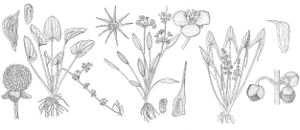Echinodorus
Manual 460. 1848.
| Taxon | Illustrator ⠉ | |
|---|---|---|
 | Sagittaria montevidensis Echinodorus cordifolius subsp. cordifolius Damasonium californicum | John Myers John Myers John Myers |
Plants annual or perennial, emersed, floating-leaved, or rarely submersed, glabrous to stellate-pubescent; rhizomes present or absent; stolons absent; corms absent; tubers absent. Roots not septate. Leaves sessile or petiolate; petioles triangular, rarely terete; blade with translucent markings as dots or lines present or absent, linear to lanceolate to ovate, base attenuate to cordate, margins entire or undulating, apex obtuse to acute. Inflorescences racemes or panicles, rarely umbels, of 1–18 whorls, erect or decumbent, emersed; bracts coarse, apex obtuse to acute, surfaces smooth or papillose along veins, apex obtuse to acute. Flowers bisexual, subsessile to pedicellate; bracts subtending pedicels, subulate to lanceolate, shorter than to longer than pedicels, apex obtuse to acute; pedicels ascending to recurved; receptacle convex; sepals recurved to spreading, herbaceous to leathery, sculpturing absent; petals white, entire; stamens 9–25; filaments linear, glabrous; pistils 15–250 or more, spirally arranged on convex receptacle, forming head, distinct; ovules 1; style terminal or lateral. Fruits plump, often longitudinally ribbed, sometimes flattened, rarely abaxially keeled, abaxial wings absent, lateral wings absent, glands often present.
Distribution
Western Hemisphere
Discussion
Species 26 (4 in the flora).
Selected References
Lower Taxa
Key
| 1 | Pistils 15–20; submersed leaves mostly present, sessile; emersed leaves narrowly lanceolate to ovate; plants relatively delicate | Echinodorus tenellus |
| 1 | Pistils 45–250; submersed leaves mostly absent, when present, petiolate; emersed | > 2 |
| 2 | Inflorescence decumbent to arching, proliferating; sepal veins papillate | Echinodorus cordifolius subsp. cordifolius |
| 2 | Inflorescence erect, not proliferating; sepal veins not papillate. | > 3 |
| 3 | Stamens 9–15; plants to 70 cm. | Echinodorus berteroi |
| 3 | Stamens 21; plants to 200 cm. | Echinodorus floridanus |